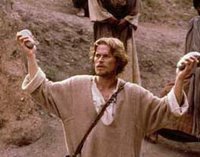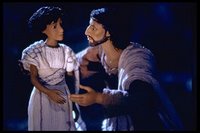More on Jesus of Montreal

On Monday I was speaking to a class of students at York St. John University about four Jesus films: Il vangelo secondo Matteo, The Last Temptation of Christ, Jesus of Montreal and The Passion of the Christ. I've spoken about all of them before, of course, but I felt I wanted to do a bit more research on Jesus of Montreal, particularly from sources other than "books about Bible films" to find of get a wider appreciation of the film, Arcand's style and how the film sits within his wider canon. Not unsurprisingly there were some really interesting insights to be had.
Firstly, Arcand's other work. Arcand started working in the sixties on history documentaries, one of the earliest and most notable being Ville-Marie (1965, also known as Les Montréalistes). Canadians will probably know that Ville-Marie was an early name for the city, and unsurprisingly the film goes into Montreal's early history. At one point the narration states “It is ironical that in the end this town should be taken over by a materialism it was founded to combat...yet the voices of its origins still echo [through the city]”1. Réal la Rochelle calls it "the pinnacle of Arcand's short films and one of the greatest ever made in Quebec" continuing that it demonstrates "that the heartfelt though mystical desire of Montreal's French founders to establish, against all logic, a city dedicated to the Mother of God, had ended in tragedy for those who conceived it".2 The film's use of religious music is particularly notable and is not unrelated to Arcand's use of Pergolesi's "Sabat Mater" in Jesus of Montreal. This further highlights Arcand's apparent hope in Jesus of Montreal that the "virtues, seemingly lost" of "the city of Mary, the city of Christianization and hospitality...have some hope of being reborn if the citizens can only recapture the charity taught by Christ and exemplified in the protagonist Daniel".3 It's significant then that the passion play in the film takes place at the St. Joseph's Oratory, "the site where Brother Andrew originally dispensed his cures...a place of pilgrimage and healing for North American Catholics".4
We see other themes emerge through his other work Réjeanne Padovani (1973) became well known within French-speaking Canada for its critique of corruption in Quebec. This was the film where "for the first time, Arcand draws a parallel between the historical fall of a great western empire and that of America, as seen from the gates of Montreal".5 As I have said many times this further underlines the importance of the scene where Jesus wanders down into an underground subway station and begins to recite Jesus' prediction of the fall of Jerusalem from Mark 13.
Two years later Arcand released Gina (1975) which featured the film within a film motif that's at the heart of Jesus of Montreal. It also "signifies the death of Quebec cinema" and of course Jesus of Montreal contains a heavy critique of the wider Québécois media.6 The film's heroine, who takes some of her income from performing stripteases, is raped so there are minor links to Mirelle's treatment at the advertising audition that so incenses Jesus of Montreal's Daniel.
As noted above music is critical to Arcand's sensibilities and we see it again here, not only in his choice of several religious pieces, but also in his use of the two singers who "progress" from the church choir, to the advertising audition to busking on the subway platform (the "monumental tomb of the empires of finance" as la Rochelle puts it).7

Across this body of Arcand's work a number of key motifs and concerns emerge and we see many of these at play within this film as well. Gambarato analysed a number of Arcand's films and noting several key "objects" that recur in a significant manner, in many of his films/8. He focussed on three in particular - Eyeglasses, Mirrors and Medicine. Given that Jesus of Montreal is not one of those included for the closest analysis, it's interesting to see that all of these crop up in this film as well.
Firstly, whilst the attention paid to glasses is not quite as important here (aside from one character wearing them), the eyes in general seem far more important, most notably the scene where a woman gets an eye-transplant using Daniel's eyes.
Secondly, no-one would claim that shots of mirrors are unique to Arcand, there is a notable shot of Mirelle starring wistfully at herself in the mirror, and all the classic meanings such as the character in two minds/being reflective/weighing different sides of her personality are present as you might expect. I don't know whether the play on words Mirelle/Mirror is intentional or just an unintended coincidence upon translation into English. What is clear is Mirelle seems to be the only figure whose life is changed by her time with Jesus.
Then there is Medicine and here the whole medical system is placed under the microscope more than in most films, even those of Arcand (though the theme is critical in The Barbarian Invasions (2003) as well, clearly). Here we see the injured Daniel moving from one hospital to another, lurching from the Catholic St Mary's hospital to an
In addition to these three main objects, Gambarato also lists a further thirteen such objects. Whilst a closer analysis of Jesus of Montreal would probably provide several other examples, the most obviously present is that of security guards. Here one of the security guards plays a significant part coming into conflict with the actors and ultimately having a role in Daniel's untimely demise.
However arguably Arcand's greatest concern is Quebec itself. His films are packed with lots of local flavour and internal critique and this film is no exception, taking on "the media... the hospital system...the legal system...the clergy" advertising and the supposedly intellectual elite.9 Montreal is "a if not the 'main character' of the movie" and the film is as much about it as it is about the Jewish peasant leader from Nazareth.10 Indeed, "this Jesus is specifically located in Montreal, immediately creating a tension between Christ's supposed universality as the saviour of humanity and the particularity of a city in Canada...The US critics trear the Lesus srory as always already universal".11Incidentally, many of these themes were also prominent in the 1987 film Le frère André directed by Jean-Claude Labrecque which having been released just two years before Jesus of Montreal forms an important element of the environment into which the film was released.
These themes continue into his work in the present day. Arcand's latest film, La Régne dela Beauté (2014) also touches on hospitals and satirises audiences (yawning on the one hand versus sycophantic praise on the other). It also includes another of Arcand's interests, not included in Gambarato's list, friendship in general and especially the act of eating together and spending time in each other's company. Again there is a link to Jesus du Montré most notably the picnic in the church grounds and the time spent in the homes of Constance and Mirelle.

Another area I've been delving into is some of the film's allegorical symbolism. Much of this is discussed fairly widely in the standard texts - Daniel as a Christ figure/prophet who is heralded by a John the Baptists figure (who even loses his head), gathers a group of disciples, is tempted at a high place by a lawyer/satan figure, clashes with religious authorities, clears out a venerated building before dying and then being symbolically resurrected. However Janis Pallister brings out some of the subtler flavours here. Daniel's surname (Coulombe), for example, "brings up our association with the Dove of Peace".12. She also associates Daniel's troupe with specific members of Jesus' entourage. Constance maps to Jesus' mother, having known Daniel before and having had and illegitimate child; Martin Durocher is Peter, the rock; Mirelle, whilst not a prostitute, has depended on her sex appeal for her work and will become his most devoted follower; and René with his in doubts and pessimism is a sort of Thomas figure. Parallels are even drawn between the ambulance man who cares for Jesus' body and Joseph of Arimathea.13
Elsewhere Pallister seems to reject and then warm to the idea that Daniel's heart being carried into the heavens in an airplane is a form of ascension and, along similar lines I would add that post Daniel's "death" on the cross, his descent into the subway ties in with the idea from 1 Peter 3:9 / the Apostles Creed about Jesus descending "into Hell" and/or preaching to the "imprisoned spirits".14 There's also an ambiguity around Daniel's resurrection. Is it physically in his rising and discharging from hospital; allegorically in his organs being used to give others life; or spiritually in the way it insires Mirelle to follow in his footsteps; or, I suppose all three?
These final scenes inspired by a real life conversation Arcand had. "A physician had told me that there are certain types of cranial traumatism that allow a period of 'resurrection' after the accident before the person actually dies. And the physician said that people who die from such traumatism are 'god sent'...because their organs are still in perfect condition of transplant."15

Finally, Rene's role within the film is also pivotal. The planetarium scene - which riffs on Nicholas Ray's Rebel Without a Cause (1955) is also identified as crucial moment. It's not just about Rene's background, but more about our small place in the universe and the importance of seizing the day despite all of this. As René's narration puts it
“Earth will revert to the galactic gases that formed it. But we will be long gone. The world began without man and will end the same way. When the last soul vanishes from Earth the universe will bear no trace of man's passing."As Arcand explains "The 'Big Bang' scene is all-encompassing than the passion-play and ultimately shapes it. The consciousness of death and emptiness is omnipresent".16
Incidentally, I realised when I started writing this post (though not when I conceived it) that I haven't actually written a review of this film yet - though I have recorded a podcast on it.
==============
1 - Cited in Janis L Pallister, “The Cinema of Quebec: Masters in Their Own House". p. 383
2 - Réal La Rochelle, "Sound design and music as tragédie en musique: the documentary practice of Denys Arcand" in Loiselle,André and McIlroy, Brian (eds), "Auteur/Provocateur: The Films of Denys Arcand". (1995) Trowbridge, Flicks Books. p.38
3 - Janis L Pallister - “Masters". p. 382
4 - Pallister – “Masters". p. 382
5 - La Rochelle - "Sound design and music", p.44
6 - La Rochelle - "Sound design and music", p.45
7 - La Rochelle - "Sound design and music" p.47
8 - Gambarato, Renira Rampazzo. "Talking Objects of Denys Arcand", in 'Revista Lumina'. 2009. Vol. 3. No. 2. p.1-12.
9 - Pallister - "Masters", p.390
10 - Pallister - "Masters", p.390
11 - Peter Wilkins, "No Big Picture: Arcand and his US Critics" in Loiselle,André and McIlroy, Brian (eds), "Auteur/Provocateur: The Films of Denys Arcand". (1995) Trowbridge, Flicks Books. p.123
12 - Pallister - "Masters", p.383
13 - Pallister - "Masters", p.383-7, though some of these observations are my own.
14 - Pallister - "Masters", p.392
15 - André Loiselle, "I only know where I come from, not where I am going": a conversation with Denys Arcand in Loiselle,André and McIlroy, Brian (eds), "Auteur/Provocateur: The Films of Denys Arcand". (1995) Trowbridge, Flicks Books. p.157
16 - La Rochelle - "Sound design and music". p.48
Labels: Jesus of Montreal






























